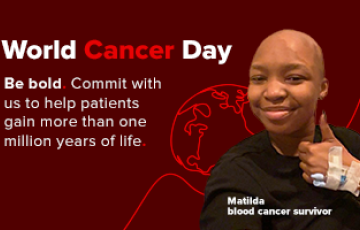Search Results

Finding Support in Community: Walgreens and LLS Show Up for Blood Cancer Patients
We all need a helping hand sometimes.
Add on a cancer diagnosis and the everyday suddenly feels... different. In many ways, harder.
Targeting kinase-dependent dysregulation of transcription factor control in acute myeloid leukemia
Defining mechanisms of dysregulated gene control are central to understanding cancer and the development of effective therapies. Our research is focused on the mechanisms of gene control dysregulation in acute myeloid leukemia (AML), a refractory form of blood cancer that affects both children and adults. Using new methods for manipulating proteins, we are defining essential mechanisms by which AML cells enable cancer-causing gene expression. This work also allowed us to develop new drugs to specifically block this in cancer, but not healthy cells.2018 Nobel Prize in Physiology or Medicine: Unleashing the Immune System
The Nobel Prize in Physiology or Medicine has been awarded today to two scientists whose groundbreaking work led to the development of a class of immunotherapies called checkpoint inhibitors that work by releasing the brakes on the immune system.
Tretinoin
Tretinoin is an FDA-approved drug that is used to induce remission in patients who have acute promyelocytic leukemia (APL, also known as "M3 AML"), a type of acute myeloid leukemia (AML), with the t(15;17) translocation and/or the presence of the PML-RARa gene and who are intolerant of, refractory to, or have relapsed from anthracycline-based chemotherapy.
211Astatine-CD123 Radioimmunotherapy for Cancer (Stem) Cell-Directed Treatment of Acute Leukemia
Because acute leukemias are very sensitive to radiation, radioisotopes are ideal payloads to arm antibodies against these difficult-to-cure, aggressive blood cancers. Here, we will develop fully human anti-CD123 antibodies carrying the highly potent alpha-emitter astatine-211 (211At) as a new therapy for acute leukemia.
Bold goal, bold action
As we observe World Cancer Day, I’m reflecting on my own family’s experience with blood cancer, the children with blood cancer I have had the honor of knowing, and the many individuals and families who have been impacted by a blood cancer diagnosis.
Our work at The Leukemia & Lymphoma Society (LLS) has had a positive impact on so many, but we can do even more to accelerate progress for the blood cancer patients we serve.